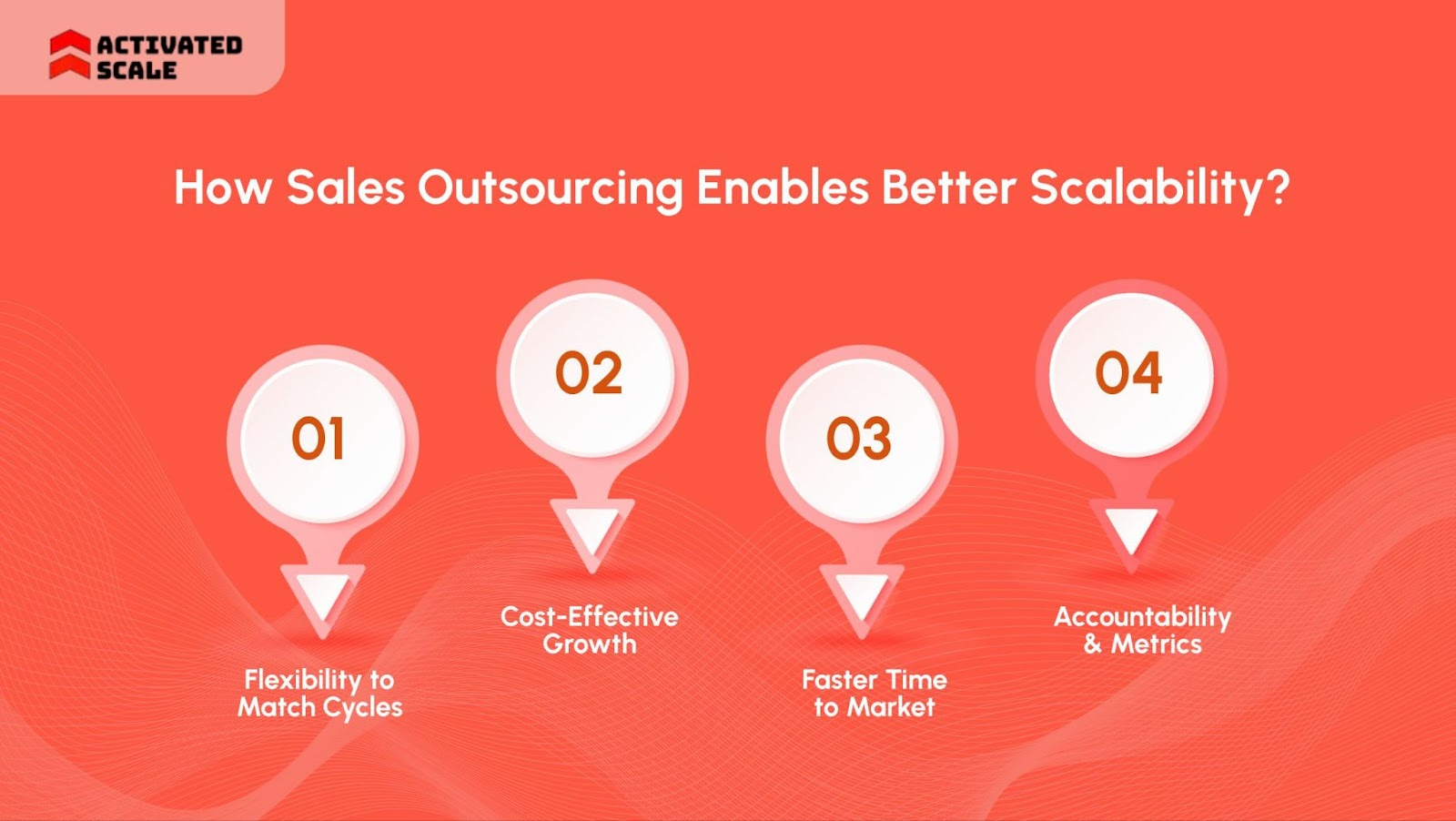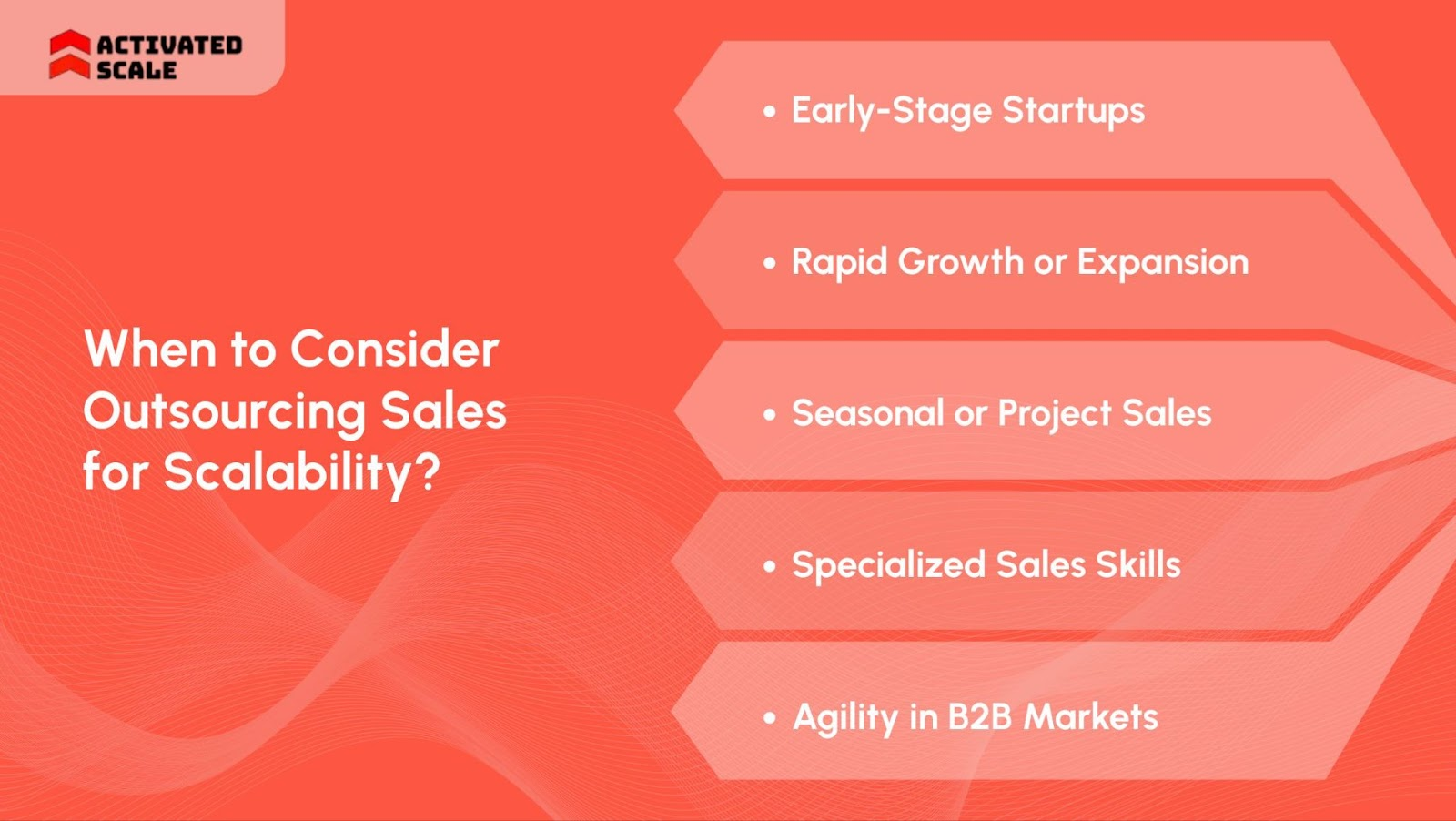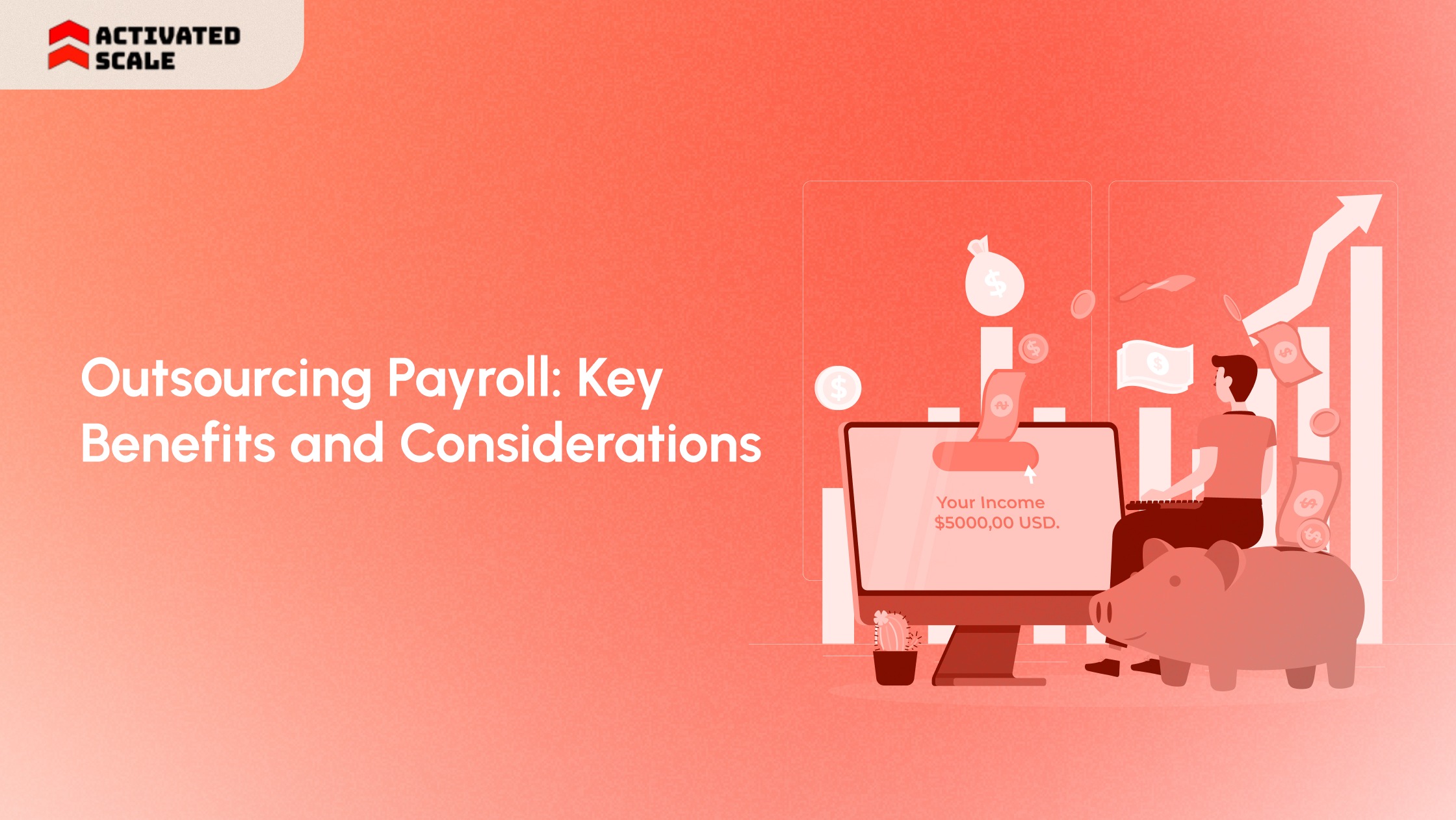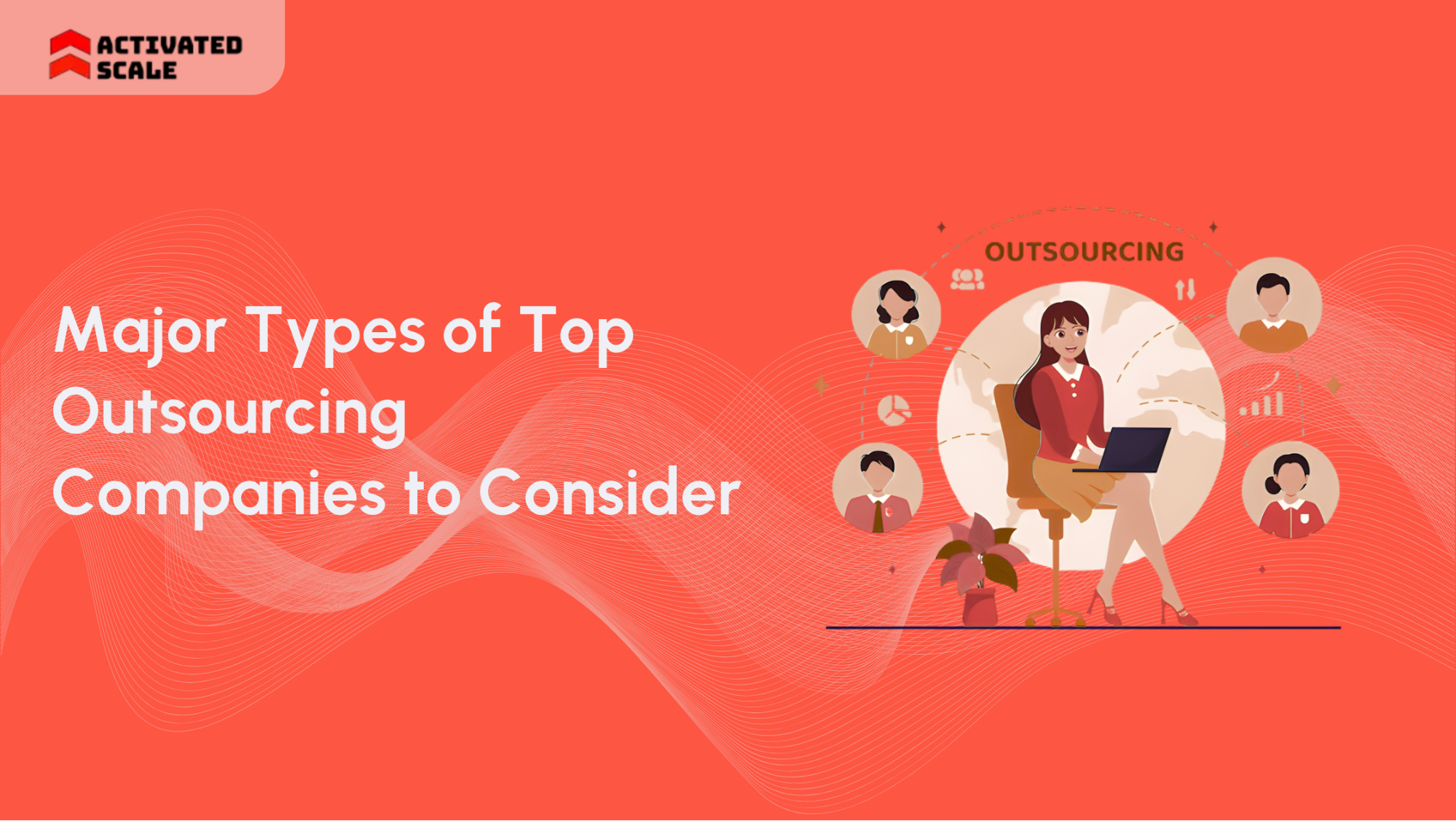Scalability in sales is the ability to quickly and efficiently expand your sales capacity in alignment with your business objectives. In business, this means having the flexibility to meet rising demand, enter new markets, or adjust to shifts in your sales pipeline, without being held back by the typical constraints of traditional hiring.
Building and scaling internal sales teams, however, often presents significant challenges: lengthy hiring cycles, high onboarding costs, training demands, and the risk of a cultural or skill mismatch. These hurdles can slow growth at critical phases, especially for startups and mid-sized companies.
As a result, an increasing number of B2B organizations are embracing outsourced sales as a flexible and strategic approach to scalability.
The global market for outsourced sales services is forecasted to grow substantially, expected to reach around $16.4 billion by 2025
Understanding flexible sales outsourcing models will position your business to respond more quickly, sell more effectively, and compete more competitively in today's market.
In a Nutshell
- Sales outsourcing allows businesses to scale quickly and flexibly by delegating sales tasks to external experts.
- It offers cost efficiency by shifting from fixed to variable costs, reducing overhead, and financial risk.
- Outsourced sales teams help accelerate sales cycles and enable faster market entry, especially for startups and SMBs.
- This approach is ideal for businesses that require rapid growth or experience seasonal fluctuations in sales.
- Activated Scale provides flexible, fractional sales talent and contract-to-hire models, making scalability accessible without heavy upfront investment.
What Is Sales Outsourcing?
Sales outsourcing is the strategic practice of delegating part or all of a company's sales activities to external experts or third-party providers, rather than managing those sales functions entirely in-house.
This approach offers businesses flexibility, access to specialized talent, and faster scalability without the full overhead and risks associated with traditional hiring.
Sales outsourcing can vary widely in scope, depending on which parts of the sales process are delegated and the chosen engagement model.
Commonly, companies outsource some or all of the following sales functions:
- Lead Generation: Identifying and qualifying new sales leads.
- Sales Development: Initial outreach and setting appointments (performed by Sales Development Representatives or SDRs).
- Account Executives (AEs): Managing the sales process end-to-end, including demos, negotiations, and closing deals.
- Sales Leadership: Outsourced sales managers or directors providing strategic oversight.
- Inside Sales: Remote or virtual sales teams handling inbound and outbound sales activities.
Sales Outsourcing Models and Features
Also Read: Integrate Fractional Sales Leaders for Team Growth
How Sales Outsourcing Enables Better Scalability

Outsourcing sales has quickly become a proven strategy for cutting costs and driving growth. As businesses increasingly turn to outsourced sales, they’re finding a faster, more innovative way to scale without the overhead of hiring full-time teams.
- Flexibility to Match Business Cycles
Sales outsourcing offers unmatched flexibility in resourcing. During growth phases, companies can scale up their sales teams quickly without incurring long-term payroll costs or infrastructure expenses.
Conversely, during slower periods, they can reduce outsourced resources without the complications of layoffs or restructuring. This elasticity aligns selling capacity directly with business needs, improving capital efficiency.
- Cost-Effective Growth
Hiring and maintaining an in-house sales team entails significant fixed costs, including salaries, benefits, training, and management expenses.
Outsourcing shifts many of these costs to a variable model where companies pay for results or resources only as needed. This reduces financial risk, allowing businesses to invest more confidently in scaling their sales activities.
- Accelerated Time to Market
Outsourced sales teams bring specialized skills, proven methodologies, and advanced technologies. Their expertise shortens sales cycles and accelerates pipeline development, enabling faster customer acquisition and revenue growth.
Companies can enter new markets or launch new products more smoothly with partners who understand how to deal with those challenges.
- Built-In Accountability and Performance Metrics
79% of companies using sales outsourcing say they have been able to expand much more quickly as a direct result. Most outsourcing arrangements include clear performance targets and flexible contract terms.
Providers are incentivized to meet agreed-upon sales goals and can be quickly reconfigured if performance falls short. This outcome-driven approach ensures that scaling sales efforts achieves measurable business impact.
Also Read: How to Effectively Manage High-Performing Sales Teams
When to Consider Outsourcing Sales for Scalability

Outsourcing sales can be a game-changer, but it’s not always the right fit for every business. There are certain situations where it can significantly improve scalability and overall performance.
Let’s break down the key scenarios when outsourcing sales makes sense:
1. Early-Stage Startups Needing Immediate Sales Traction
Startups often face the challenge of establishing their market presence while operating with limited resources. Outsourcing sales can provide the necessary boost without requiring significant upfront investments in a full-time team.
- Why Outsource?
- Quick market penetration
- Access to seasoned professionals without hiring costs
- Test different sales strategies without long-term commitment
2. Companies Undergoing Rapid Growth or Geographic Expansion
As a company expands quickly, whether by entering new markets or scaling existing operations, having the ability to scale sales teams swiftly is crucial. Outsourcing enables companies to deploy sales resources in new regions or verticals without the logistical challenges associated with in-house recruitment.
- Why Outsource?
- Speed of execution in new regions or markets
- Scalable solutions for geographic or market growth
- Flexible, short-term arrangements that align with expansion needs
3. Firms Facing Seasonal or Project-Based Sales Demand
Some industries experience spikes in sales demand during specific periods, such as holidays or major product launches. Outsourcing provides the flexibility to scale the sales team up or down based on demand without the financial burden of maintaining a large in-house team during off-seasons.
- Why Outsource?
- Ability to handle fluctuations in sales volume
- Cost-effective scaling during peak seasons or projects
- Avoid the need for long-term staffing commitments
4. Businesses Requiring Specialized Sales Skill Sets
There are situations where businesses need specialized sales skills that are difficult to find or too expensive to hire internally. Whether it’s enterprise-level B2B sales expertise or niche industry knowledge, outsourcing can connect you with professionals who already have the required skill sets.
- Why Outsource?
- Access to specific skills without the lengthy recruitment process
- Faster onboarding of experts who understand your market
- Flexible engagement terms to meet immediate needs
5. Situations Demanding Agility in Fast-Changing, Complex B2B Business
The B2B buying behaviour is increasingly getting complex, with buyers' behaviors, technology, and market dynamics changing rapidly. Outsourcing sales functions can provide the agility to respond to shifts in buying trends without the rigidity of an internal team.
- Why Outsource?
- Quickly adapt to changes in the buying landscape
- Benefit from the latest sales strategies and technologies
- Agile sales operations that allow for faster pivots
Also Read: How AI Is Transforming Contract Sales Outsourcing In 2025
Common Pitfalls & Solutions in Outsourcing Sales for Scalability
Outsourcing sales can undoubtedly lead to significant growth and success, but pitfalls along the way can hinder this progress. Understanding common challenges and how to address them ensures a smoother, more scalable sales outsourcing journey.
Also Read: How to Use Sales Intelligence for Competitive Outsourcing
As businesses adopt best practices and proactively mitigate common pitfalls, the need for specialist partners who can deliver agility, expertise, and measurable results becomes increasingly necessary. This is particularly true for startups and SMBs, where every sales decision has an outsized impact on growth and resource allocation.
Activated Scale: Scalable Sales Outsourcing for Startups and SMBs
Activated Scale offers a flexible and cost-effective sales outsourcing solution designed to help businesses scale quickly and efficiently. By providing fractional sales talent, including AEs, SDRs, and sales leaders, Activated Scale enables companies to access experienced professionals without the overhead of traditional full-time hires.
Activated Scale’s Offerings
- Fractional Sales Talent: Gain access to experienced sales professionals aligned with your buyer profiles and sales goals, enabling faster market penetration and growth.
- Contract-to-Hire Model: Minimize hiring risk by engaging sales talent on a trial basis before committing to full-time hires, ensuring the right fit for your business.
- Minimal Upfront Investment: Perfect for startups and SMBs, Activated Scale helps scale sales teams without significant upfront costs or long recruitment processes.
- Scalable Growth: Activate fractional or full-time sales resources based on your evolving needs, allowing for quick adaptation to market changes and business demands.
Key Sales Outsourcing Metrics and ROI Impact for Scalable Growth
Monitoring the essential KPIs with data-driven dashboards and regular review cycles helps companies optimize their outsourced sales efforts continuously.
This disciplined approach enables faster realization of ROI and supports sustainable, scalable sales growth, far quicker than relying on traditional in-house hiring and ramp-up timelines.
Conclusion
Sales outsourcing is becoming an increasingly critical lever for businesses seeking to maintain agility in an ever-evolving market. As buyer behaviors and market dynamics continue to shift, companies are increasingly turning to flexible, technology-enabled sales teams to address these complexities efficiently.
By adopting outsourcing, companies can innovate more rapidly, stay ahead of competitors, and focus on their core strengths.
Activated Scale is a forward-thinking partner for outsourcing sales to drive scalable revenue growth. They offer the right mix of fractional and full-time sales talent to help businesses achieve sustained, scalable growth.
Contact Activated Scale today to explore how our solutions can fuel your business’s growth journey.
FAQs
- What are the benefits of outsourcing sales for scalability?
Outsourcing sales enables businesses to quickly adjust their sales efforts in response to market demands, seasonal fluctuations, or the introduction of new products. This flexibility allows companies to scale operations up or down without the delays and costs associated with hiring and training in-house staff.
- How does outsourcing sales reduce operational costs?
By outsourcing sales functions, companies can eliminate expenses related to recruitment, salaries, benefits, training, and infrastructure. This cost-effective approach allows businesses to allocate resources more efficiently, focusing on core activities while leveraging external expertise for sales operations.
- What types of sales outsourcing models are available?
Businesses can choose from various outsourcing models, including:
- Full-stack outsourcing: Outsourcing the entire sales process from lead generation to closing deals.
Mixed model: Combining in-house and outsourced teams, such as handling lead generation externally while managing closing internally. - Geographic outsourcing: Employing local providers in different regions to minimize risks and cut costs.
- How can outsourced sales teams help businesses enter new markets?
Outsourced sales teams bring specialized knowledge and experience to the table, enabling businesses to enter new markets more effectively. They can quickly adapt to local market conditions, understand cultural nuances, and implement strategies tailored to specific regions, facilitating smoother market entry and expansion.
- What metrics should be tracked to evaluate the performance of outsourced sales?
Key performance indicators (KPIs) to assess the effectiveness of outsourced sales teams include:
- Conversion Rate: Percentage of leads converted into customers.
- Lead Quality: Assessment of the potential value of leads generated.
- Sales Cycle Length: Time taken from initial contact to closing a deal.
- Customer Acquisition Cost (CAC): Total cost incurred to acquire a new customer.
- Customer Retention: Ability to maintain long-term customer relationships.
The Ultimate Guide to Hiring a Salesperson!
Get the step-by-step guide to hiring, onboarding, and ensuring success!
_edi.png)




